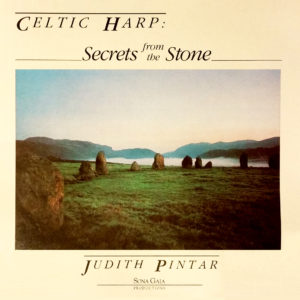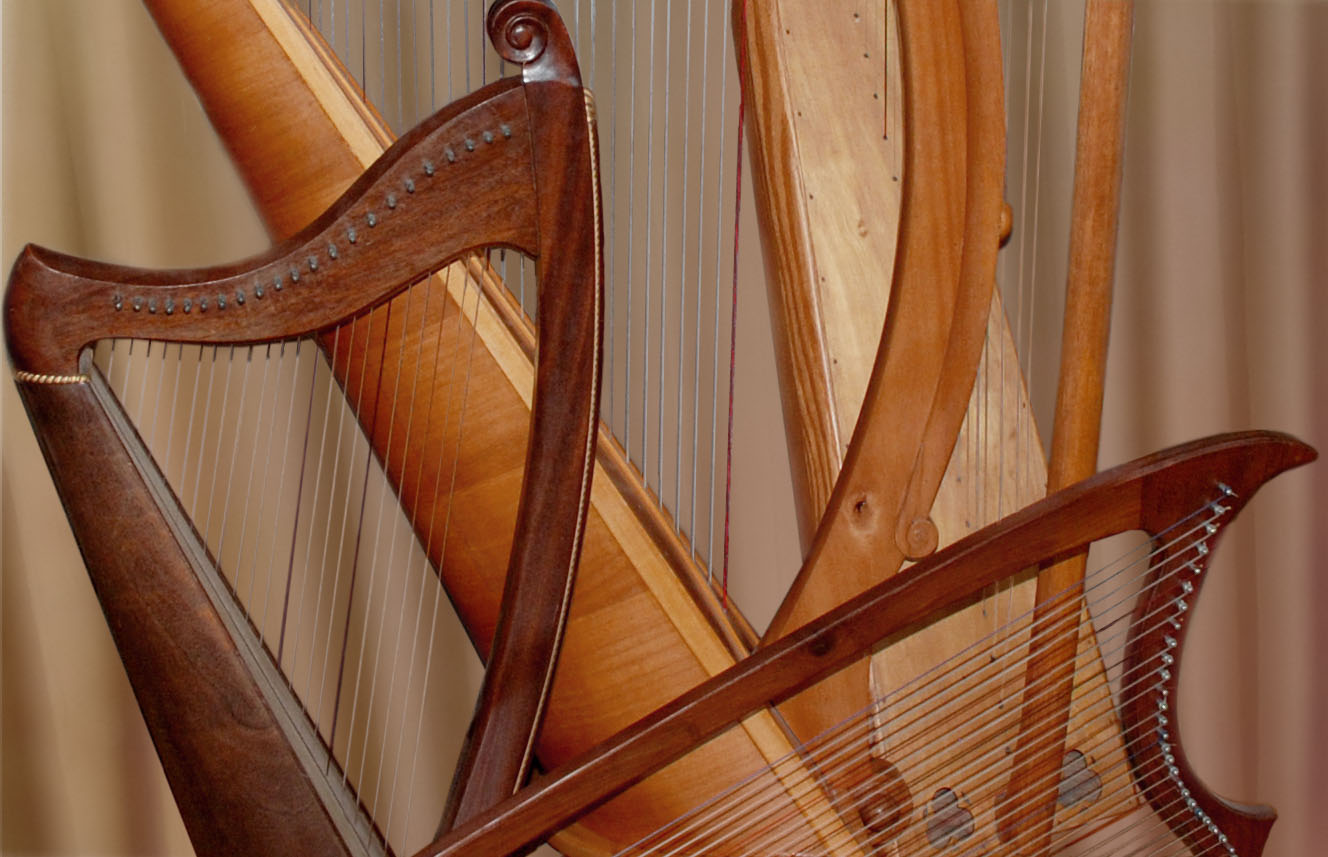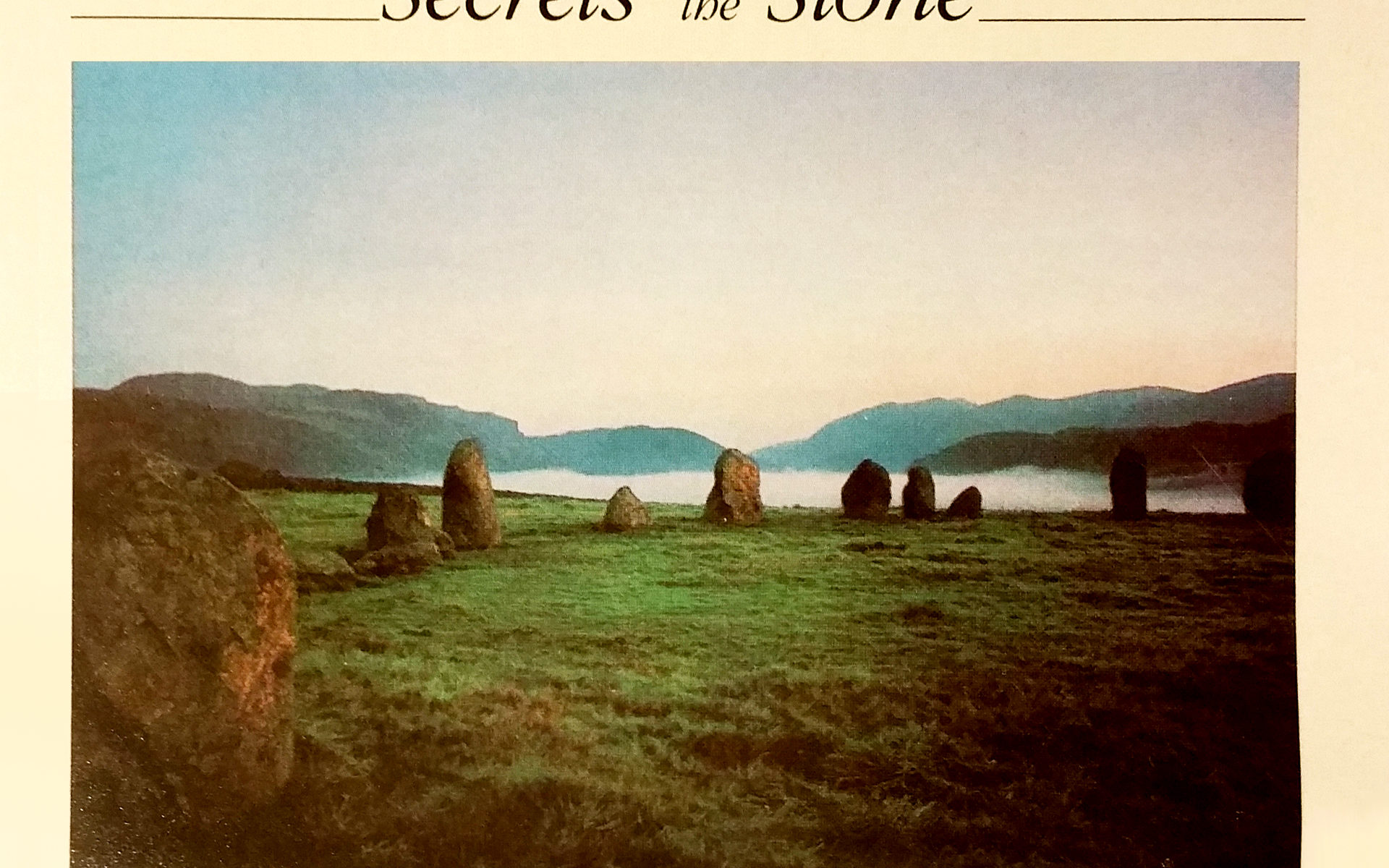 Secrets from the Stone was my first recording of original compositions for the Celtic harp under the Sona Gaia/Narada label. The compositions were meant to accompany a collection of short stories entitled “To Be Read Aloud”. These were published in the liner notes of the first LP release in 1984, though subsequent releases on cassette and CD omitted them against my wishes.
Secrets from the Stone was my first recording of original compositions for the Celtic harp under the Sona Gaia/Narada label. The compositions were meant to accompany a collection of short stories entitled “To Be Read Aloud”. These were published in the liner notes of the first LP release in 1984, though subsequent releases on cassette and CD omitted them against my wishes.
The story that inspired the title track is a retelling of my experience as an eighteen-year-old hitchhiking across Wales in search of a harpmaker.
The quest was a successful one — I composed Secrets from the Stone on a Telyneg harp from the workshop of the renowned Welsh harp maker, John Weston Thomas of Pembrokeshire (1921-1992) now run by his former apprentice and son, Alun Thomas. My Telyneg is the harp in the foreground of this website’s header. photo. The album was recorded on a Tara Harp built by Robinson’s Harp Shop in Mt. Laguna California, the harp standing just behind the Telyneg in the photo.
Bedd Taliesin
The grave is unmarked and there are no signs to show tourists the way. Two figures stride across a field of grazing sheep, away from the main road that runs through the village of Tre Taliesin on the western coast of Wales.
“Is this the right way, do you think?” one asks. The farmer who had given the directions had been short with them.
“Hm, what?” says the other. He doesn’t care if they reach their destination at all. The sun is high, the day fine, and from this high in the hills they might glimpse the sea. But the first traveler isn’t to be distracted as she pulls her companion along.
“Is this it, do you think? It doesn’t much look like a grave.”
“Hm, what?”
A large flat rock is set into the hill. Closer inspection reveals that it balances upon three smaller rocks embedded deeply into the ground. They look ancient enough to have been a natural formation.
“Here we are,” she decides, releasing one long held breath. “Here we are.”
But the other, stretched out fully on the ground and blanketed by the sun’s heavy gaze, is fast approaching his personal destination.
“Oh, typical,” she thinks, annoyed. But now she is alone, and standing in front of the grave of Taliesin, the greatest bard in the long memory of Welsh legend and history.
“Here I am,” she says. She isn’t sure what she expects to see, but a ghostly visage dancing upon a misty moor would be nice. The sun is just too bright. She sinks to the ground beside the stone.
“You see,” she explains, “there’s music in me that wants out. And that’s why I’m here. To ask you – to try to find –” She stops, suddenly feeling foolish. Taliesin has been dead for thousands of years, if he ever really lived at all. She is about to rouse her friend when she is struck by a whim. She lays her ear flat against the old, old stone. What she hears is the low slow beating of its heart. She is pulled into the stone, into the darkness, into the web of time.
The Teller and the Listener
“Here you are,” says a voice, pulling her into the sunlight again. A man sits on the stone looking at her with a curious eye.
“You are Taliesin?” she asks. “Shouldn’t you be old?”
He laughs at her with the ease of a humor that has all the time in the world. Then he stands, and bows. When he speaks his voice is deep and resonant:
I was in many a guise
Before I was disenchanted.
I am a gray-cowled minstrel:
I lived for a time in the sky.
I was a message in writing.
I was an eagle.
I was a coracle in the sea.
I was a sword in the hand.
I was a shield in battle.
I was a string in a harp
Enchanted nine long years…
She nods, recognizing the riddle. “Thank you for bringing me here.”
He sits down again upon the rock, motioning her to sit beside him. “You’re very welcome, except that I didn’t bring you. The world provides an answer for any question truly asked.”
His bright eyes sharpen and he searches her expectant face. “So you want to be a bard, and you want to know what that means. I can tell you this — when you tell a story you become more and less than what you are, sharing in a creation that is real at the precise moment that it leaves your lips and reaches the ear. No time passes. The speaking becomes the listening as the story becomes real in a listeners’ mind.“
Now there is a cruit in his hand, a small rectangular harp, and his fingers lose themselves in a quick melody that follows itself around and around.
“The movement of my hands corresponds to the words of a tale. The music is the tangible creation of my heart and yours. What are we creating?”
She looks away, but he has already read her through and through. “The music didn’t make you love me. It just asked the question, what is the bond between us? I listened for the reply and saw it in your eyes. You’ll see the answer too, if you look into mine.”
She can’t find the courage to raise her eyes.
Taliesin is on his feet and his voice is sorrowful. “Never ask a question if you are afraid of the answer.”
Then he is gone or, rather, he is no longer visible. His voice continues, not sad any longer, now powerful and undeniable, a tempest, a gale.
The Chase
“Suppose that you are a child given the chore of stirring a cauldron of herbs, ignorant as to their purpose. Three drops of the boiling liquid splash onto your fingers. What do you do?”
As he speaks she feels a terrible burning on her right hand. Without thinking, she pops three fingers into her mouth to ease the pain. Suddenly she is aware of a cottage all around her, and the presence of a very angry woman. She knows, as she stands sucking her burned fingers, that the drops from the cauldron have changed her, have gifted here with wisdom and far sight. Her sight tells her that the woman glaring at her is Ceridwen, a witch.
She gives thought to an escape. As soon as a plan occurs to her, the transformation is complete. Swift as a hare, in fact in the shape of a hare, she flees the cottage.
But close behind and in pursuit is Ceridwen, shaped as a greyhound.
Just as the dog is about to overtake her, the hare leaps into a river and becomes a fish. Just as quickly greyhound becomes otter. She barely has time to slip from the otter’s bright teeth and claws to launch herself into the air as a darting sparrow, when otter becomes hawk, swift and far-sighted. Poor sparrow takes refuge in a place of mankind, a barn. In exhaustion she becomes a grain of winnowed wheat, and thinking herself safe at last, she relaxes into this anonymity.
Then she hears the scratching and soft clucking of a hen.
“In the form of a black tufted hen the witch Ceridwen swallowed me, a grain of wheat, and gave birth to me nine months later.” Taliesin’s voice is peaceful as he ends his tale.
She finds herself back sitting upon the stone, alone.
There is a length of silence before she gathers the courage to speak. “So which is your true shape?”
She can hear his laughter all around her. It is gentle now, a breeze.
“Which is not true?”
“But how can you be real if you have no form?”
“What is the wind that has no shape? What is music? What is a word? You came looking for Taliesin though he was dead, and found him. Then you learned that he couldn’t be found. “
She knows this is a riddle, but the meaning eludes her.
“Just listen for the answer,” he says. “You know it’s there.”
Doing as she has been bid, she presses her ear closely to the stone and hears the low, slow beating of its heart. It captures her again and pushes her back into her own time.
The sleeping form beside her stretches and yawns. “Are you ready to go?”
“In a minute,” she replies, desperately trying to puzzle out the answers she had been given.
But her companion is restless. “I don’t see what’s so fascinating about an old grave.”
“It’s not a grave!” she cries, understanding in that instant that the power of Taliesin’s words and his music had never left the world.
“Let’s go,” she says, with apologetic smile, and they do.
As they walk across the Welsh hills and towards the sea, she feels the heartbeat of the stones beneath her feet and hums along with the keening of the wind among the trees.

